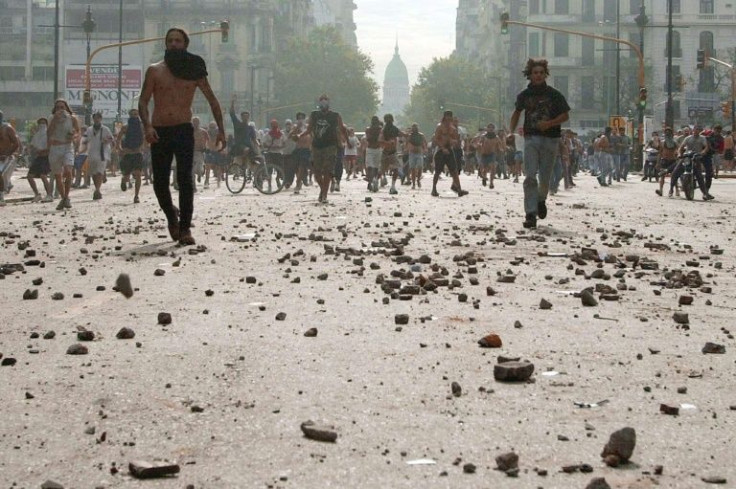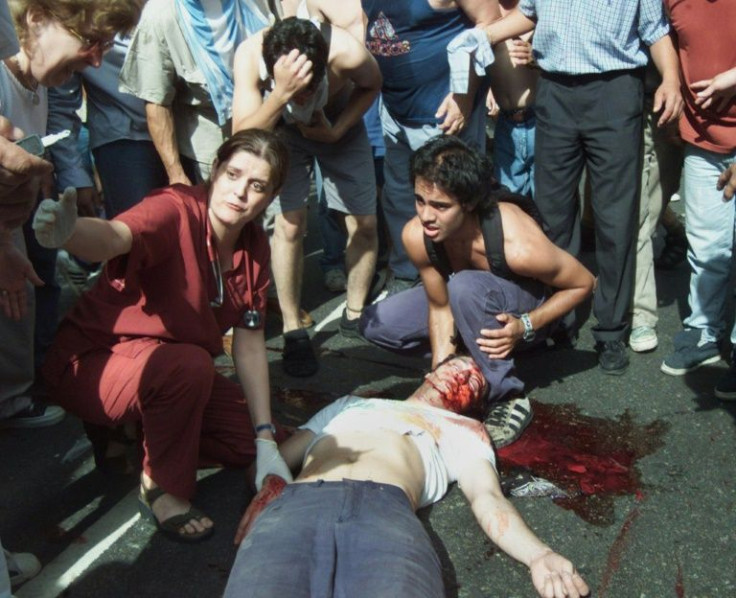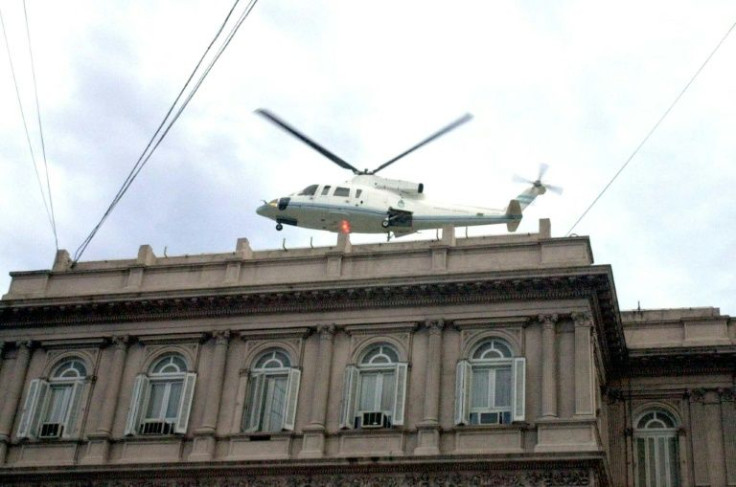Trauma Of Argentine 'Great Crisis' Lives On 20 Years Later
An illusion of prosperity, a headlong rush into debt and years of austerity collided 20 years ago to provoke one of the biggest crises in Argentina's history.
The subsequent social unrest left scars that can still be felt today.
The scenes were dramatic: people pounding on bank shutters, looting shops and falling under a hail of police bullets, and a president escaping by helicopter.
In 2001, Argentines still believed in the "one for one" conversion rate between the peso and US dollar instigated under conservative Peronist president Carlos Menem (1989-99) initially to control inflation.
The experiment lasted a decade before the roof fell in.
It was a time when Latin American countries surfed a wave of neo-liberal open markets, privatizations and heavy debt.

The middle classes were purchasing imported goods with an over-valued peso.
But local industry collapsed, the budget deficit grew, austerity plans followed one after another and investors lost confidence.
It sparked a capital flight and a cash crisis. The state was forced to react in December 2001 to prevent the collapse of the banking system.
The government ordered a bank deposit freeze and limited cash withdrawals to 250 pesos a week.
In what became known as the "corralito" -- playpen -- many Argentines were enraged, while others went hungry.

Protests and looting abounded, with president Fernando De La Rua declaring a state of siege -- a move that reminded citizens of the dictatorship years and poured fuel on the fire.
On the night of December 19, thousands of people descended on the Plaza de Mayo square where parliament sits to bang pots and pans in protest.
The finance minister's resignation did nothing to calm the mood.
"They must all go!" cried the crowd.
The outbreak provided the spark for a heavy-handed police attempt to disperse protesters, with almost 40 people killed and hundreds injured throughout the country.

On the evening of December 20, De La Rua resigned and fled the presidential palace by helicopter.
His successor Adolfo Rodriguez Saa lasted just one week but still had time to decree the largest default in history: $100 billion.
Many Argentines saw their savings go up in smoke.
Recently, actor Ricardo Darin recalled tearfully how his late mother "right up until her last days, asked me if there would be a chance of recovering the money she lost at the bank."
Eventually, he decided to lie, telling her "it's in the hands of lawyers, and they say it should be possible. You should have seen the way her eyes lit up."
A pioneer cardiology study found that in the period from April 1999 to December 2002, there were 20,000 more fatal cardiac arrests in Argentina than would normally have been expected, partly due to stress but also because of the degradation of the health system.
Twenty years on, there is "a painful, bloody memory," historian Felipe Pigna told AFP.
"The fear of a social convulsion, the loss of savings. It's a phantom that reappears in times of crisis, in critical situations. Not necessarily in rational terms but in emotional ones."
In 2001, Argentines felt like "orphans, abandoned by the state, the parties, the banks."
But it was also a time in which the people took matters into their own hands, organizing "mutual aid cooperatives, neighborhood soup kitchens, public meetings to find solutions to daily problems."
It was the start of an "autonomous" reconstruction, added Pigna.
The recovery began with a painful devaluation and a spectacular restructuring of debt negotiated by Peronist president Nestor Kirchner (2003-07).
In a country where poverty has reached 40 percent, there remains a huge suspicion around anything debt related.
Argentines bristling at the very mention of words such as "default" or "adjustment," ever more so since former president Mauricio Macri arranged a $44 billion loan with the International Monetary Fund (IMF) in 2018.
"The international context in 2021 is different, the IMF attitude, too," said Pigna.
But even while current President Alberto Fernandez's insists that "the Argentina of adjustments belongs to history" while he tries to renegotiate the IMF debt, the population remains jumpy.
In November, a fake news story that the government was preparing a new "corralito" saw hundreds of millions of dollars withdrawn from banks in a matter of days.
© Copyright AFP 2024. All rights reserved.





















